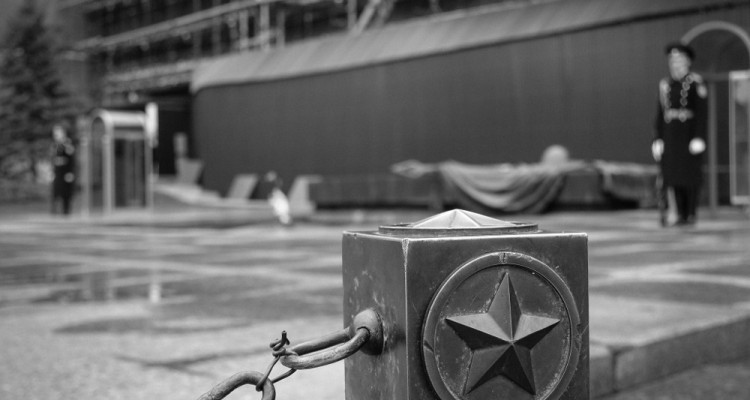It’s hard to decide what the highly acclaimed Russian political drama, Leviathan, does best: masterfully capture the key facets of Russian life under Putin or convey the universal hopelessness in any individual’s attempt to override the structures of power.
At it’s most simple level, the film follows a car mechanic and fisherman, Nikolai, as he struggles against a corrupt mayor in a small, remote Russian town. Nikolai is an honest, strong-willed, and passionate character, whose sole demand of the state is that he retain the property that has been in his family for generations. This will allow him to continue living his life with peace and dignity, loving his beautiful young wife, Lilia, and raising his son. The town’s notably corrupt mayor, however, has other plans for Nikolai’s land, wanting to force him from it and to use it for political gain. Nikolai’s friend, Dima—a slick Moscow lawyer—comes to help, but ends up making matters worse by having an affair with Lilia, which eventually ends in her suicide. The state frames Nikolai for her death and incarcerates him for 15 years—this after taking his property. His life, in other words, is completely shattered. In the end, Kolya’s plight is anything but provincial, reflecting the vapid corruption veiling all levels of governance, the lethal fusion of politics and religion, and the stark cultural disconnect between the center and the regions.
Corruption goes unpunished
Leviathan offers scene after scene that peel back the many layers of corruption in Russian society from the grassroots to the very top. In one scene, the local police chief, demanding mechanical favors, arrives at Kolya’s house unannounced and blissfully solves crossword puzzles while Kolya fixes his car for free. In the court scenes, where Kolya’s appeal to stop the mayor from taking his land and where Kolya is accused of murdering his wife, a stone-faced woman reads out the sentence at a staccato speed— signifying the cursory nature of a corrupt judicial system. These scenes were anxiety inducing, mirroring other verdicts recently delivered in a similar manner in Russian courts: the cases of Navalny, Russia’s top opposition figure, and of Khodorkovsky, come to mind. Yet, in the film as in the “power vertical” of Russia’s governance apparatus, corruption can often go unpunished: when Kolya expresses disbelief that the mayor will face no consequences for corrupt behaviour, Dima remarks, “He is useful to someone at the top.”
Power as a gift from god
Religion also does not escape Leviathan’s criticism—it’s depicted as a hypocritical force exacerbating and almost facilitating corruption. On the one hand, the mayor bribes the chief priest with delicatessen. On the other, the priest has huge influence over the mayor, reassuring him that power will be granted as a gift from God. The priest also openly tells the mayor that only by use of force can he intimidate the enemy—advice the mayor takes to heart. This emphasis on religion reflects the recent tightening relationship between the Russian Orthodox Church and the leadership as well as the resurgence of moral values in the official discourse and the general increase in popularity of Russian Orthodoxy in post-Communist Russia. The ambiguous public attitude towards the role of religion is also skillfully reflected: like the Russian public, Dima dismisses the question of whether he believes in God by saying that he is a lawyer who believes in facts instead. And at the end of the film, Kolya despairs in God completely, asking the local priest where God is now.
City vs. country
The very real and ambivalent relationship between the big-city Russians (namely those residing in Moscow and St Petersburg) and the provincial Russians (living in the rest of the country) appears as another prominent theme. Dima, for instance, tries to convince Kolya and Lilia to move to Moscow, but Kolya’s attachment to his land (that seems so desolate to Dima) is too strong. Dima’s determination to help his friend using his Moscow smarts as a signature card also fail: the local mayor manages to trick him.
Dima’s failed attempt to rescue his friend made me think of struggles that Moscow activists face in local battles. When I asked Navalny, during a lecture in London in 2010, whether he is building networks with anti-corruption activists at the local level, his answer was negative. He explained that the obstacles, including the treacherous local-level dynamics, are difficult to navigate for even local activists. At the same time, the film also hints at the shared understanding of corruption and struggles against power between urban dwellers, like Dima, and small-town folk, like Kolya. A recent essay by Dmitriev and Triesman underscores these commonalities, suggesting that the discontent with corruption and the desire for a fair and accountable system is more prominent in Russian regions than it may appear at a distance.
The starkness of Leviathan reaches beyond Russia: while I watched the painful scene of demolition of Kolia’s house, I thought of China and the many tragic stories of people being forced out of their homes for local government projects that are often linked to corrupt schemes. In truth, the capacity of power to crush the individual to the very core of his being could resonate with any context.
Further Reading:
- Balzer, Harley. “Managed Pluralism: Putin’s Emerging Regime,” Post-Soviet Affairs. 19:3 2003.
- Dmitriev, Mikhail and Daniel Treisman. The Other Russia: Discontent Grows in the Hinterlands. Foreign Affairs. September/October 2012.
- Ledeneva, Alenac. Can Russia Modernize?, Cambridge University Press. 2013.
- Orthodox Corruption?, Al Jazeera. Feb 07, 2013.
- Taylor, Brian D. State Building in Putin’s Russia: Policing and Coercion After Communism. Cambridge University Press. 2013.
Image credit: Brandon via Flickr






